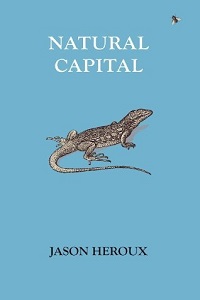Jason Heroux. Natural Capital. Toronto: Mansfield Press, 2012.
~Reviewed by Rod Pederson
Natural Capital effectively employs synecdoche to talk about the world; a subset of living and inert subjects and objects in the poems represents all that surrounds them. Heroux employs an iconography in which leaves and trees stand in for the plant world, stone for the geological world, and so on. Heroux takes the concept of “natural capital”—land, air, water, living organisms, the Earth’s biosphere, and the ways in which these “natural” elements provide a human economy—and examines it in order to reveal interconnectedness between and among humans and the world in which we live.
Mostly, Natural Capital is a helluva good read. I inhaled its 47 poems in one long breath—they left me excited and wondering exactly what it is that makes them so captivating. We’re hooked from the first poem, “Tiny Kingdom,” where “wind chimes are a gentle alarm / warning everyone that nothing is wrong,” where “ants creep through the grass / like little coffins carrying themselves” and where birds sing “like cheerful ambulances.” A pattern emerges by which opposites are embedded inside of one another—“gentle alarm,” “warning … nothing is wrong,” and “cheerful ambulances.” Life walks hand in hand with death, joy with pain, and it’s always intriguing.
Heroux produces some fabulous lines: “An overworked day takes its name tag off” (“Hello, Predators”); “clouds drift … / like eighty-year-old ballerinas crossing the street” (“In the Suburbs of the Holy City”); and “A small white butterfly fluttered around like a price tag // attached to the air” (“From a Caribbean Diary”). Some of the poems are decidedly surrealistic: “The Watermelon” is about a melon that “started screaming and bleeding” when cut. In “The Instructions,” something goes wrong—“the instructions began following me” with devastating impact. A larger number of poems, however, contain beautifully crafted tropes that only flirt with the surreal. So, there is a ‘degree of surrealism’ here, a range of genre-bending that is extraordinary and effective.
A real strength of the book is that it comes to no moral conclusion. The book is matter-of-fact in its dealings with natural processes but permits itself a certain optimism. “Long Weekend” promises that “Even when we finally end / we’ll continue like a road with no one on it.” The closing poem, “Here,” affirms “We’re not yet done… / let us linger a little longer in life’s boiling joy.” Boiling joy. The presence of pain in happiness. Great book. I’d give it several major prizes all at once.
Rod Pederson is an Ottawa poet and event organizer. He was one of the founding members of VERSeFest, Ottawa’s international poetry festival and, until recently, was the Director of the Tree Reading Series.
Find a synecdoche for life in Arc‘s poetry.


